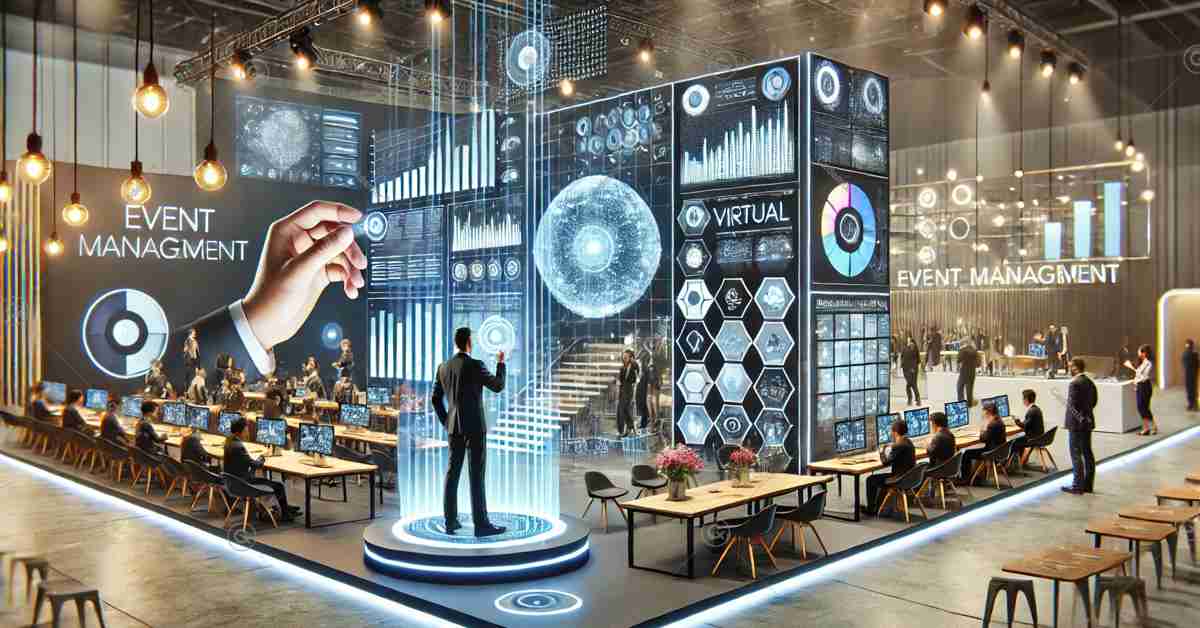In the dynamic world of Event Management, mastering key skills such as effective communication, organization, problem-solving, and budget management is essential for success. This article delves into the core competencies every event planner needs, highlighting the importance of Event Technology Tools, creativity in event planning, and staying ahead of Event Trends in 2024. By integrating these skills, planners can not only manage logistics efficiently but also create unforgettable experiences. Whether navigating Hybrid Events or executing Sustainable strategies, this guide equips professionals to excel in the competitive field of Event Planning.
By Samareh Ghaem Maghami, Associate Consultant and Project at Cademix Institute of Technology
Introduction
In today’s fast-paced and ever-evolving industry, Event Management has become a critical skill set for creating memorable and successful events. Whether you’re planning a corporate conference, a lavish wedding, or an international trade show, the ability to effectively manage every aspect of an event is paramount. As the demand for innovative and seamless experiences grows, so does the need for event planners to master a range of essential skills. From effective communication and organizational prowess to problem-solving and budget management, these core competencies are the backbone of successful Event Planning.
Additionally, staying ahead of Event Trends in 2024 and leveraging the latest Event Technology Tools are crucial for delivering cutting-edge events that resonate with today’s audiences. In this article, we will explore the key skills every event manager must cultivate to thrive in this competitive field, ensuring not just the flawless execution of events but also their lasting impact.

Effective Communication: The Cornerstone of Successful Event Management
Effective communication is the cornerstone of successful Event Management and plays a pivotal role in every stage of the Event Planning process. From the initial client consultation to coordinating with vendors, stakeholders, and team members, clear and concise communication is essential to ensure that all parties are aligned with the event’s goals and expectations.
In Event Planning, stakeholder management requires the ability to engage and maintain positive relationships with everyone involved, from clients and sponsors to attendees and suppliers. This involves not only delivering clear instructions but also actively listening to feedback and concerns, ensuring that every voice is heard and valued. Strong communication skills are also vital for effective leadership in event planning, enabling you to lead your team with confidence and clarity.
Moreover, the use of modern Event Technology Tools can significantly enhance communication efficiency, allowing for real-time updates, streamlined collaboration, and seamless information sharing. By mastering these tools and techniques, event planners can avoid misunderstandings, reduce errors, and ensure a smooth flow of information throughout the event lifecycle.
In a field as dynamic as Event Management, where last-minute changes and unexpected challenges are common, the ability to communicate effectively is what often sets apart successful events from those that fall short. Whether you are negotiating with vendors, updating clients, or coordinating logistics, strong communication skills are indispensable for executing an event that meets and exceeds expectations.
Organizational Skills: The Backbone of Efficient Event Management
In the world of Event Management, organizational skills are the backbone of efficient and successful Event Planning. Managing an event involves juggling countless details, from coordinating logistics planning to ensuring that timelines, budgets, and resources are meticulously managed. Without strong organizational abilities, even the most creative and innovative event ideas can fall apart due to poor execution.
Effective Project Management is at the heart of organizing a successful event. This involves creating detailed timelines, setting clear milestones, and ensuring that every task is assigned and completed on time. A well-organized planner can manage multiple events simultaneously, each with its unique requirements, while maintaining the same level of precision and attention to detail.
Event Technology Tools play a crucial role in enhancing organizational efficiency. These tools allow event managers to streamline tasks, automate processes, and keep track of all aspects of the event in one place. From digital checklists and calendar apps to advanced project management software, technology has become an indispensable ally in managing the complexities of modern events.
Furthermore, organizational skills extend to budget management and vendor negotiation, where keeping track of expenses, contracts, and payment schedules is critical to staying within budget and avoiding last-minute surprises. By being meticulously organized, event planners can ensure that every aspect of the event runs smoothly, from the initial planning stages to the final execution.
In an industry where the smallest oversight can have significant consequences, mastering organizational skills is essential for delivering events that are not only successful but also memorable. Whether managing a large-scale international event or a small local gathering, a well-organized approach ensures that every detail is accounted for, leading to a flawless and impactful event experience.
Problem-Solving Abilities: Navigating Challenges in Event Management
In the dynamic and often unpredictable world of Event Management, strong problem-solving abilities are a crucial skill that every event planner must possess. No matter how meticulously an event is planned, unexpected challenges are bound to arise—whether it’s a last-minute venue change, a vendor falling through, or unforeseen technical issues. The ability to think on your feet, adapt quickly, and find effective solutions is what sets successful event managers apart from the rest.
One of the most common challenges in Event Planning is managing unforeseen circumstances without compromising the quality of the event. This requires a combination of quick thinking, resourcefulness, and the ability to stay calm under pressure. Whether it’s negotiating with vendors to resolve a conflict or finding a creative workaround when faced with logistical issues, an event planner’s problem-solving skills are constantly put to the test.
Vendor negotiation is a prime example of where problem-solving comes into play. Securing favorable terms and handling disputes require not only strong communication but also the ability to find mutually beneficial solutions that keep the event on track and within budget. Similarly, effective budget management often demands creative problem-solving to balance the event’s vision with financial constraints.
The role of Event Technology Tools in problem-solving cannot be overstated. Technology can provide real-time data, facilitate instant communication, and offer alternative solutions when things don’t go as planned. For instance, using technology to track and manage logistics can help identify potential issues before they become critical, allowing for proactive problem-solving.
Ultimately, the ability to overcome challenges with grace and efficiency is a hallmark of a seasoned event manager. By honing your problem-solving abilities, you can navigate the complexities of Event Management with confidence, ensuring that any obstacles are turned into opportunities for growth and improvement. This not only ensures the success of the current event but also enhances your reputation and credibility in the highly competitive field of Event Planning.

Budget Management: Mastering Financial Efficiency in Event Management
Budget management is one of the most critical skills in Event Management, directly impacting the success and sustainability of any event. Whether you’re planning a small corporate meeting or a large-scale international conference, mastering the art of financial efficiency is essential to delivering an event that meets expectations without exceeding the allocated resources. Effective budget management not only ensures that the event stays within financial constraints but also allows planners to allocate funds strategically, maximizing the value of every dollar spent.
At the core of successful budget management is meticulous planning. This involves creating a comprehensive budget that accounts for every possible expense, from venue costs and catering to marketing and Event Technology Tools. It’s crucial to anticipate potential costs and include a contingency fund to cover unexpected expenses, which are almost inevitable in the complex process of Event Planning.
A well-managed budget also requires ongoing monitoring and adjustment. As the event progresses, keeping a close eye on expenditures and comparing them against the initial budget allows planners to make informed decisions and avoid overspending. This financial vigilance is particularly important in sustainability practices, where balancing eco-friendly initiatives with cost-effectiveness can be challenging. Implementing sustainable practices doesn’t have to break the bank; with careful planning, it’s possible to create an event that is both environmentally responsible and financially sound.
Vendor negotiation plays a significant role in budget management as well. Skilled event managers know how to negotiate contracts that offer the best value for money, securing favorable terms without compromising on quality. Whether it’s negotiating with caterers, venue managers, or technology providers, the ability to strike the right deals can make a significant difference in staying within budget.
In today’s rapidly evolving industry, leveraging Event Technology Tools can further enhance budget management. These tools provide planners with real-time insights into spending, enabling them to adjust allocations quickly and efficiently. By integrating technology into your financial planning process, you can streamline budget management, reduce waste, and ensure that every aspect of the event is financially optimized.
Ultimately, budget management is about more than just crunching numbers—it’s about making strategic decisions that align with the event’s goals and ensure a positive return on investment. By mastering this skill, event planners can deliver high-quality experiences that meet client expectations while maintaining financial integrity, reinforcing their reputation as reliable and efficient Event Management professionals.
Creativity and Innovation: Elevating Event Planning to New Heights
In the competitive world of Event Management, creativity and innovation are essential to stand out and deliver truly memorable experiences. As attendees’ expectations continue to rise, event planners must push the boundaries of traditional Event Planning by incorporating fresh, imaginative ideas that captivate and engage. From experiential marketing to the latest event trends in 2024, creativity is the driving force behind successful and impactful events.
Creativity in event planning begins with the concept and theme of the event. Whether it’s a corporate gathering, a product launch, or a social celebration, developing a unique and cohesive theme that resonates with the audience is key. This involves not only understanding the goals and objectives of the event but also thinking outside the box to create an experience that is both visually stunning and emotionally engaging. Planners who infuse their events with creative elements—from innovative décor and entertainment to interactive experiences—leave a lasting impression on attendees, enhancing the overall success of the event.
Experiential marketing is another area where creativity shines in Event Management. By designing events that engage all the senses and encourage active participation, planners can create deeper connections with attendees, leading to more memorable and impactful experiences. This approach is particularly effective in brand activations, where the goal is to create a strong, emotional bond between the brand and the audience. Leveraging event technology tools such as augmented reality, virtual reality, and interactive displays can elevate these experiences, making them more immersive and engaging.
Keeping up with event trends in 2024 is also crucial for staying ahead in the industry. As trends evolve, so do the expectations of clients and attendees. For instance, the rise of hybrid events—which combine in-person and virtual elements—requires planners to innovate and adapt their strategies to create seamless experiences across both platforms. Incorporating the latest trends not only demonstrates a planner’s forward-thinking approach but also ensures that the event feels current and relevant.
Innovation also extends to sustainability in event planning. As the demand for eco-friendly events grows, planners are challenged to find creative solutions that minimize environmental impact without sacrificing quality. This might involve using sustainable materials, reducing waste, or implementing energy-efficient technologies. By creatively addressing sustainability, event managers can enhance the appeal of their events while contributing positively to the planet.
Incorporating creativity and innovation into every aspect of Event Management is not just about making an event visually appealing—it’s about crafting an experience that resonates with attendees, aligns with the event’s goals, and leaves a lasting impact. By embracing creativity, staying informed about emerging trends, and continually pushing the boundaries of what’s possible, event planners can elevate their events from ordinary to extraordinary, ensuring their success in a highly competitive market.

Leveraging Technology: Transforming Event Management in the Digital Age
In the rapidly evolving landscape of Event Management, the integration of advanced Event Technology Tools has become indispensable for planners seeking to streamline processes, enhance attendee experiences, and deliver successful events. From the initial stages of Event Planning to the final execution, technology plays a critical role in transforming how events are conceptualized, organized, and executed.
One of the most significant impacts of technology on Event Management is the ability to automate and simplify complex tasks. Event Technology Tools such as project management software, digital registration platforms, and real-time communication apps enable planners to manage multiple aspects of an event simultaneously with greater efficiency. These tools help keep track of timelines, delegate tasks, monitor budgets, and ensure that every detail is accounted for, reducing the risk of errors and oversights.
The rise of hybrid events, which blend in-person and virtual experiences, underscores the importance of technology in modern Event Planning. With the ability to reach a global audience, hybrid events require sophisticated technology to ensure seamless interaction between physical and virtual attendees. Planners must leverage tools like live streaming platforms, virtual reality, and interactive apps to create engaging and immersive experiences that resonate with all participants, regardless of location.
Event Technology also plays a pivotal role in enhancing the attendee experience. From the moment attendees register to the post-event follow-up, technology facilitates a smooth and personalized journey. Mobile event apps, for example, provide attendees with real-time updates, personalized schedules, and interactive maps, while also enabling networking opportunities through chat functions and social media integration. By harnessing the power of technology, event planners can create a more engaging and interactive experience that keeps attendees connected and involved throughout the event.
In addition to improving logistics and engagement, Event Technology is vital for data collection and analysis. Through the use of analytics tools, planners can gather valuable insights into attendee behavior, preferences, and feedback. This data-driven approach allows for more informed decision-making, helping planners to refine their strategies and improve future events. Whether it’s tracking attendance patterns, monitoring social media activity, or analyzing post-event surveys, technology provides the tools necessary to measure success and identify areas for improvement.
Moreover, technology is instrumental in enhancing sustainability in Event Planning. Digital ticketing, virtual events, and paperless communication are just a few examples of how technology can reduce the environmental footprint of events. By adopting these eco-friendly practices, planners not only contribute to sustainability but also appeal to increasingly environmentally-conscious audiences.
In conclusion, leveraging Event Technology Tools is essential for staying competitive and delivering exceptional events in today’s digital age. By embracing the latest technological innovations, event managers can streamline operations, engage attendees, and gain valuable insights, all while ensuring a seamless and impactful event experience. As the industry continues to evolve, staying ahead of event trends in 2024 and beyond will require a commitment to integrating cutting-edge technology into every aspect of Event Management.
Post-Event Evaluation: The Key to Continuous Improvement in Event Management
The conclusion of an event does not mark the end of the Event Management process; instead, it signals the beginning of a critical phase—post-event evaluation. This step is essential for continuous improvement and long-term success in Event Planning. By thoroughly analyzing the event’s outcomes, gathering feedback, and assessing the overall performance, event planners can refine their strategies and ensure even better results in future endeavors.
Post-event evaluation involves a comprehensive review of all aspects of the event, from attendee satisfaction and stakeholder management to financial performance and logistical efficiency. One of the most effective ways to gather insights is through attendee feedback. Utilizing Event Technology Tools, such as online surveys and feedback forms, allows planners to collect real-time data on attendee experiences, preferences, and areas of improvement. This feedback is invaluable for understanding what worked well and what needs adjustment, enabling planners to tailor future events more effectively to their audience’s needs.
Analyzing the event’s budget management is another crucial component of post-event evaluation. By comparing the initial budget projections with the actual expenses, planners can identify any discrepancies and understand where costs may have exceeded expectations. This analysis provides valuable lessons on how to better allocate resources, negotiate with vendors, and manage finances in future events, ensuring more accurate budgeting and financial control.
The evaluation process also extends to the performance of event technology and logistics. Planners should assess how well the Event Technology Tools functioned, whether they enhanced the attendee experience, and if they met the event’s operational needs. Additionally, a review of the event’s logistics planning—from setup and execution to teardown—can reveal opportunities for streamlining processes and improving efficiency in future events.
Stakeholder management is another area that benefits from thorough post-event evaluation. Engaging with sponsors, vendors, and other stakeholders after the event helps to maintain strong relationships and gather feedback on their experiences. This interaction not only reinforces partnerships but also provides insights into how the event was perceived from a business perspective, which is crucial for securing future collaborations.
Finally, post-event evaluation should include a look at the long-term impact of the event, particularly in terms of branding and marketing outcomes. Did the event achieve its marketing goals? Was the experiential marketing strategy successful in creating a lasting impression? By analyzing these outcomes, event planners can refine their approach to Event Marketing and enhance the overall effectiveness of their strategies.
In conclusion, post-event evaluation is a vital step in the Event Management process that drives continuous improvement and future success. By systematically reviewing every aspect of an event—from attendee satisfaction to financial performance—planners can gain the insights needed to refine their strategies, enhance their skills, and deliver increasingly successful events. This commitment to learning and adaptation is what ultimately sets top-tier event managers apart in the highly competitive world of Event Planning.

Leadership in Event Planning: Guiding Teams to Success in Event Management
Strong leadership is a cornerstone of effective Event Management, playing a crucial role in guiding teams, making strategic decisions, and ensuring that every event runs smoothly from start to finish. As an event manager, your ability to lead with confidence and clarity not only influences the success of the event but also impacts the morale and productivity of your team. Leadership in event planning requires a blend of vision, communication, and decision-making skills that together create an environment where creativity and efficiency thrive.
Effective leadership begins with stakeholder management. As an event leader, you are responsible for aligning the goals and expectations of all involved parties, from clients and vendors to your internal team. This requires clear and consistent communication, as well as the ability to negotiate and resolve conflicts in a way that maintains positive relationships. By setting a clear vision and ensuring that everyone is on the same page, you can guide your team and stakeholders toward a common goal, ensuring the event’s success.
One of the key responsibilities of a leader in Event Management is the ability to make informed and timely decisions, especially under pressure. Whether it’s addressing last-minute challenges or making strategic choices about budget management and logistics planning, strong decision-making skills are essential. Leaders must be able to assess situations quickly, weigh the available options, and choose the best course of action to keep the event on track. This decisiveness not only prevents potential issues from escalating but also instills confidence in your team, encouraging them to follow your lead.
Event Technology Tools can be a powerful ally in leadership, providing you with the data and insights needed to make better decisions. By leveraging technology to monitor event progress, track team performance, and analyze real-time feedback, you can lead more effectively, ensuring that every aspect of the event is aligned with your strategic vision.
Leadership in Event Planning also involves fostering a collaborative and supportive team environment. By encouraging open communication, valuing diverse perspectives, and recognizing the contributions of each team member, you create a positive work culture that motivates your team to excel. This collaborative approach not only enhances the creativity and innovation within your team but also leads to better problem-solving and more successful event outcomes.
Moreover, a strong leader in Event Management is always looking ahead, staying informed about emerging event trends and continuously seeking ways to improve their skills and strategies. Whether it’s embracing sustainability in event planning or adapting to the rise of hybrid events, effective leaders are proactive in adapting to industry changes and guiding their teams through new challenges and opportunities.
In conclusion, leadership in event planning is about more than just managing tasks—it’s about inspiring and guiding your team to achieve excellence in every aspect of Event Management. By combining strategic vision with strong communication, decision-making, and team-building skills, you can lead your events to success, ensuring that each one is more impactful and memorable than the last. As the event industry continues to evolve, strong leadership will remain a key factor in the ability to deliver exceptional events and thrive in a competitive market.
Conclusion: Mastering the Essential Skills for Success in Event Management
In the competitive and ever-evolving field of Event Management, mastering a comprehensive set of essential skills is key to standing out and delivering successful, memorable events. From effective communication and organizational skills to problem-solving abilities, budget management, creativity, and the strategic use of Event Technology Tools, each of these competencies plays a critical role in the seamless execution of events.
As we’ve explored, strong leadership in event planning is crucial for guiding teams and stakeholders toward achieving a shared vision, while staying ahead of event trends in 2024 ensures that your events remain innovative and relevant. Incorporating sustainability and embracing the possibilities of hybrid events are also increasingly important in today’s industry, where eco-conscious practices and virtual engagement are becoming the norm.
The importance of post-event evaluation cannot be overstated, as it provides the insights necessary for continuous improvement, allowing you to refine your strategies and deliver even better results in future events. By focusing on these core areas, event managers can not only meet but exceed expectations, ensuring their events are both impactful and successful.
In conclusion, excelling in Event Management requires a blend of diverse skills, strategic thinking, and a commitment to ongoing learning. By mastering these essential skills and staying attuned to industry changes, event planners can build a reputation for delivering high-quality, innovative events that leave a lasting impression. Whether you’re navigating the complexities of logistics planning, negotiating with vendors, or leveraging the latest Event Technology, these competencies will empower you to lead your events to new heights, ensuring success in this dynamic and challenging field.

About the Author
Samareh Ghaem Maghami is a seasoned event manager and interior decorator with a robust background in the arts and event planning. Currently, she is advancing her expertise as a member of the Cademix Institute of Technology, where she combines her artistic talents with cutting-edge event management techniques. With years of experience in both the creative and executive aspects of event planning, Samareh brings a unique perspective to the industry, blending creativity with strategic execution. Her passion for innovation and commitment to excellence make her a sought-after expert in the field.
For those interested in delving deeper into the world of event management, Samareh invites you to read her latest article, “Sustainability in Event Planning: How to Go Green,” published in Cademix Magazine. This piece explores the latest trends and strategies for creating eco-friendly events that leave a lasting impact.
To learn more, collaborate, or discuss event management strategies, please feel free to contact Samareh. You can also explore her other articles, where she shares insights and practical advice on various aspects of event planning and management.
Please feel free to contact her at:
E-mail: sam.gh.maghami@gmail.com
E-mail: samareh.ghaem-maghami@cademix.org
LinkedIn: https://www.linkedin.com/in/samareh-ghaem-maghami
Xing: https://www.xing.com/profile/Samareh_GhaemMaghami

